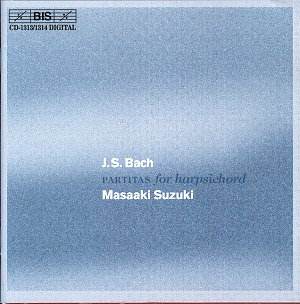Bach’s keyboard partitas were his first published works, his
opus 1. These six suites were actually the last suites Bach wrote for
keyboard, and owe a great deal to French influence. Masaaki Suzuki continues
his exploration of Bach’s keyboard works with these fine pieces, performed
on a beautiful sounding harpsichord.
The first thing that strikes the listener of this set
is the extraordinary sound both of the instrument (a Ruckers copy) and
the recording itself: the harpsichord is miked close enough to pick
up the rich range of the instrument and its subtle harmonics, but the
sound is not overbearing.
Suzuki plays the first partita at a leisurely tempo,
with the prelude flowing naturally, the allemande following in perfect
time, the corrente picking up speed just the right amount, the sarabande
played in a stately manner with fine ornamentation, the minuets graceful
and the giga lively. All the movements of all six partitas follow in
this same manner - neither hurried nor slow, Suzuki seems to have found
the ideal tempi for these works. Slower than most recordings, with all
repeats played, this set is just over 160 minutes - one of the longest
harpsichord recordings available.
While Suzuki seems to master almost every movement
in this set, he plays the finest performance of the long allemande in
the fourth partita that I have ever heard. Slow and sinuous, sensuous
and organic, he plays this, the heart of the partitas, as it should
be heard. For this movement alone it is worth buying this set.
Something grabbed me as I started listening to this
recording. The sound is certainly one of the elements that got me hooked,
but there is something subtle in the way Suzuki plays that goes beyond
the music. This is actually a bit surprising - while he is one of the
finest conductors of Bach’s sacred cantatas, his solo harpsichord recordings,
while excellent, have never gotten me excited. But there is magic in
this disc. These works, that I know very well, came alive in a way no
other performer is able to do. My previous favorites for these works
were the recordings by Edward Parmentier, on Wildboar, and Trevor Pinnock,
on Haenssler. But Suzuki comes in at the head of the pack. Whether this
recording is "better" than the others is very subjective,
but it definitely belongs up in the top three. The naturalness of his
playing, the appropriateness of his tempi, and his limited and subtle
ornamentation all work together to make this a nearly perfect recording.
This is one of the finest recordings of these works
available on harpsichord. Suzuki performs these works in a very personal
way, but his interpretation works perfectly. A must-have recording.
Kirk McElhearn
